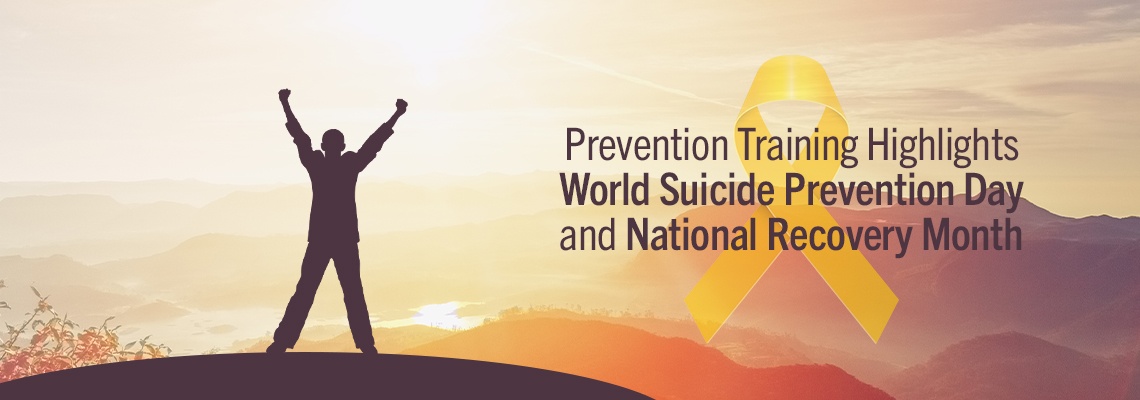
Foundation Connections

Prevention Training Highlights World Suicide Prevention Day and National Recovery Month
Published 9/21/2020
The NBCC Foundation recently hosted a Substance Use and Suicide Prevention Training event. Held on September 10, World Suicide Prevention Day, and during National Recovery Month, the event provided an opportunity for counseling professionals and counseling students to hear from mental health providers specializing in areas of substance use, suicide, self-harming behaviors, and peer support. The training was offered at no cost to current NBCC Foundation Scholarship recipients, NBCC Minority Fellowship Program Fellows, and board certified counselors and was made possible as a part of the Substance Abuse and Mental Health Services Administration’s (SAMHSA) Minority Fellowship Program.
Presenters included Dr. Meagan Houston, who recently retired from the Houston Police Department, where she was a full-time police psychologist and worked with the Psychological Services Division to provide services to police officers, family members, and civilian employees. She is currently in private practice in Houston, Texas, and engages in clinical work and training with a focus on working with clients who experience suicidal ideations.
Dr. Houston’s presentation focused on understanding the dynamics of suicidal clients and working with their grieving loved ones. Attendees were able to gain insight into the suicide loss survivor experience, learn how to better address their immediate needs, and understand how culture and family system dynamics impact and complicate the grief process for clients.
Dr. Masica Jordan-Alston, founder of Jordan Peer Recovery (JPR) based in Baltimore, Maryland, has taught multicultural counseling courses for over 10 years and has developed proprietary educational materials and programming to support and strengthen the peer recovery workforce.
She delivered a presentation focused on building participants’ approaches to recovery support while teaching how to develop cultural responsiveness. The presentation challenged attendees to explore and reflect upon how personal values, biases, and assumptions can impact the quality of interactions between providers and clients or families.
Dr. Jordan-Alston also introduced JPR’s ASK Model for Cultural Responsiveness, an in-depth training developed to further provide culturally responsive peer support through three main components: asking yourself questions, learning through a variety of specific activities to inform a culturally responsive approach, and asking questions of peers.
The keynote presentations and trainings were followed by a panel discussion that included Dr. Houston and Dr. Jordan-Alston alongside Dr. Shana Lewis, board certified counselor, MFP Doctoral Fellow Alumna, and member of the MFP Advisory Council; Dr. John O’Neil, director of outpatient treatment at The Menninger Clinic in Bellaire, Texas; and Cheryl Duncan, founder of the Ashley Jadine Foundation, which she created after her daughter, Ashley, died by suicide at age 17.
Presenters and panelists discussed the ongoing need for counselors and mental health professionals to embrace cultural responsiveness as they work to break the stigma related to mental health in Black communities and in areas where mental health services are not widely available. They also emphasized the need for counseling professionals to seek self-care and regular counseling services for themselves in order to offer the best versions of themselves to their clients. Panelists stressed the importance of this especially for those working with vulnerable populations and those who may experience the loss of a client through suicide or substance use.
Isaac Dietermann, a 2020 MFP Addictions Counseling Fellow and student at Central Michigan University, shared that the trainings were especially helpful to ensure his clients “are receiving the appropriate care” and that he is “taking the necessary measures to make sure that the client is safe.” Dietermann currently works as an outpatient therapist in a rural and impoverished area in Clare, Michigan, and plans to continue working with those in recovery after graduation.
Dietermann and the other 89 MFP Fellows from the 2020 cohorts will receive additional training supports through JPR as a part of their program through the SAMHSA MFP. This additional support will provide supplemental workbooks and in-depth trainings to provide them with a deeper understanding and practice of providing culturally responsive services for those they work with in underserved communities.
As a part of its mission, the NBCC Foundation works to provide ongoing continuing education opportunities for counselors-in-training and counseling professionals who are focused on providing services for underserved and never-served communities and clients. For information on upcoming monthly webinars, visit the upcoming webinars webpage. Stay tuned to the NBCC Foundation Connections newsletter and NBCC Foundation website for announcements about upcoming special events and continued offerings.

